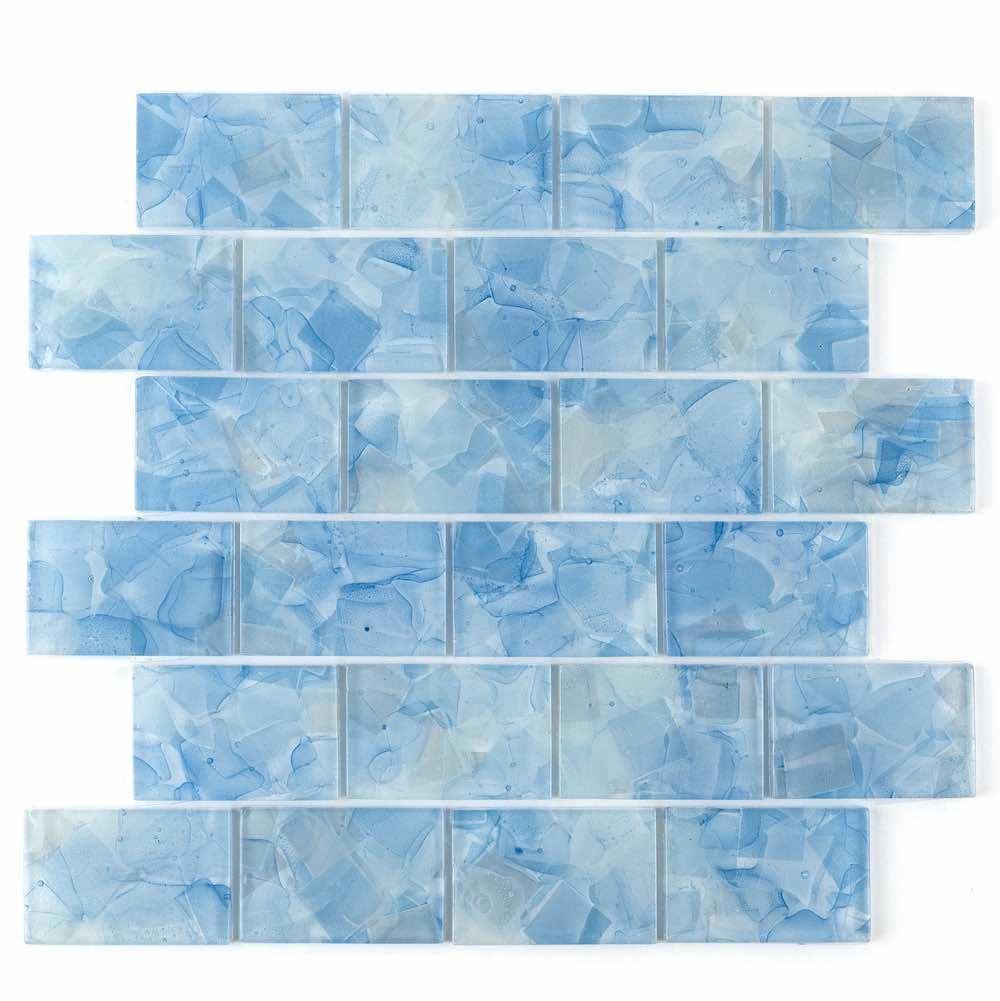
Glass Mosaic Tile Ceramic Liquid
Glass mosaic tile is a wonderful choice for bathroom backsplashes, shower surrounds and even your swimming bath area. They’re also simple to clean and are resistant to stains, bacteria, mildew, mold and fingerprints.
However, glass mosaic tiles are a bit more fragile than other flooring materials. They’re best suited to low-traffic areas where they won’t be subject to frequent wear and tear.
Easy to Clean
You can keep your glass mosaic tile sparkling for a long time with the right cleaning routine. It is relatively easy to clean, and you don’t need harsh chemicals like some other types of tile.
A simple solution of water and vinegar is usually enough to remove stains from ceramic, glass, and porcelain tiles. Simply spray the mixture on the surface and leave it for about 10 minutes. You can also use a mild detergent to scrub the area.
To make the process more effective, you can wipe or mop the floor. Then, you can dry the area thoroughly to remove excess moisture.
You can easily clean stained and dirty glass mosaic tiles in the bathroom, kitchen, or pool. However, if you have stone or marble mosaics in your bathroom, they can be scratched by hard cleaning products, so it is important to use non-abrasive cleaning agents.
It is also a good idea to clean your grout periodically. This will prevent it from collecting dirt and stains that can deface the tiles’ beauty.
Before you mop your grout, you should first sweep it thoroughly and wipe down the floor to remove any loose dirt. Alternatively, you can use a special cleaner that is formulated for tile and grout.
Keeping your grout clean will help it look its best, and it will prevent any residue from causing damage to your mosaic tile. You can either use a special grout stripper or just apply a cleaning solution to the grout and wipe it off with a sponge.
For stone or marble mosaics, you can use a natural stone cleaner that does not contain acids or bleach. Just follow the directions on the bottle, ensuring that the product is safe for your particular material.
It is also a good practice to regularly sweep and vacuum your glass or mosaic tiles. These steps eliminate dust and dirt stains, which will maintain the original radiant glow your mosaic tiles have when you installed them.
For a luminous appearance, you can add color coatings to your glass or marble mosaics. These are a great way to add depth and interest to your tile. These are available in many different colors, so you can customize your home to suit your tastes.
Resistant to Scratches
Glass tiles are known for their durability and scratch resistance, and they can be used to add a bright, luminous look to kitchen backsplashes or shower surrounds. They come in many sizes, shapes, and colors so you can find a design that is perfect for your space.
Glass is a non-porous material, so it is resistant to stains, bacteria, and mildew. It does, however, show fingerprints and water spots more easily than ceramic tile, so regular cleaning is necessary to keep it looking its best. If soap scum or other stains do occur, a solution of vinegar and water can be used to remove them.
There are several different types of tiles available for residential use, including ceramic, terra cotta, and porcelain. All offer benefits to homeowners, but there are certain differences in their properties that you should be aware of before choosing the right tile for your needs.
* Glazed: Most ceramic tiles are glazed, which seals the clay to prevent liquid absorption and staining. It also adds waterproofing and durability to the tile. This is a good option for spaces where moisture is not desired, as well as areas where an earthy aesthetic is important.
Unglazed: Not all ceramic tile is glazed, glass mosaic tile ceramic liquid and some can be made of red clay without a glaze. This is a good choice for those who prefer an earthy appearance, but it can be more porous than glazed tiles.
It is important to choose a glazed tile if you are planning on placing it in a bathroom or other high-use area where moisture is likely to occur, as these are the most durable and easy to clean. Those with heavy traffic in these areas should also consider using a textured tile for added protection.
In addition to being resistant to scratches, porcelain tile is also very stain-resistant. This makes it an ideal material for a kitchen backsplash or other area where a lot of food preparation and cooking takes place.
Lastly, porcelain is extremely hard and glass mosaic tile ceramic liquid dense, making it an excellent choice for high-traffic and commercial applications. It can withstand extreme temperatures, and it is highly durable and resistant to cracking or breaking under direct force.
Easy to Install
Glass mosaic tile ceramic liquid is an easy-to-install product that makes it possible to create beautiful and unique designs on floors, walls, and in swimming pools. It also offers many benefits over other types of tile, including high resistance to stains and scratches and the ability to be easily cleaned.
One of the most popular applications for glass mosaic tile is in kitchen backsplashes, where it can be used to create stunning designs that complement any style. They come in a variety of colors and are resistant to stains, bacteria, mildew, and mold.
If you’re installing a backsplash, the first step is to clean the area thoroughly. This includes removing all dirt, grime, and any other particles that may have collected on the surface. This is particularly important in areas where the wall has a lot of water or moisture.
After cleaning, you’ll need to prepare the substrate for the glass tiles. This involves using a notch trowel to spread thin-set mortar over the entire surface of the tile. This should be a high-quality, liquid latex fortified mortar.
When the thin-set mortar has hardened, press the sheet of glass tile into it. The white mesh on the back should completely disappear into the thin-set, but it might be visible at times. It’s OK, though, as long as it doesn’t affect the look of the design.
Next, apply grout. Unsanded grout is recommended for grout seams of 1/8 inch or smaller, while sanded grout is preferred for larger seams. You can use pre-mixed grout if you have the time or don’t mind waiting a few days before mixing up a batch of your own.
During the installation process, you should be careful to avoid applying excess grout, as this can mar the glass tile’s appearance. This is especially true if you’re using glass mosaic tiles with wide grout seams, or in pool applications where the pool’s chemicals can cause light transmission or reflectivity issues that can be distracting.
Glass tile is an expensive material, so it’s a good idea to do your research before you buy any. This will ensure that you’re getting a quality product that meets your expectations and can stand up to the test of time.
Versatile
Glass tile is a material that’s becoming increasingly popular among designers and homeowners because of its versatility. It’s available in a variety of colors, styles, and finishes and is easy to clean. It can be installed in a wide range of spaces, including bathrooms and kitchens.
Unlike ceramic tile, which is made from natural clay that’s fired in a kiln, glass tiles are manufactured using a different process. During manufacturing, raw materials are melted and pressed together to form a crystalline structure.
This process is called fusing and results in glassy surfaces that are softer than ceramic tile. These softer surfaces are easier to cut and shape, making them more flexible in design applications.
These tiles are also less expensive than ceramic and offer a more durable finish that resists scratches and stains. Depending on the type of glass tile used, it may also be resistant to fire or heat.
For example, glass mosaic tile is often used as a backsplash in a kitchen because it can withstand water splashes and high temperatures without damage. Plus, glass is a reflective material that can brighten a room and add a beautiful glow to the area.
Choosing the right style of glass mosaic tile can make all the difference in a room. Choose a design that’s bold and eye-catching or subtle and understated. You can even choose a mix of colors, shapes, and patterns to create your own unique design.
The most common type of glass mosaic tile is rectangular, but there are many specialty designs that you can choose from to suit your specific needs. These include chevron, Amalfi, Athens, and Stria tile patterns, among others.
A popular option for bathroom and shower floors, glass tiles are resistant to scratches and stains. They are also easy to clean and durable, so you can keep them looking great for years to come.
In addition to being highly versatile, glass tiles are also eco-friendly. They’re made from a recycled material and require half as much energy to manufacture as ceramic tile. They’re also extremely light and easy to clean, making them a great choice for any home or commercial space.



